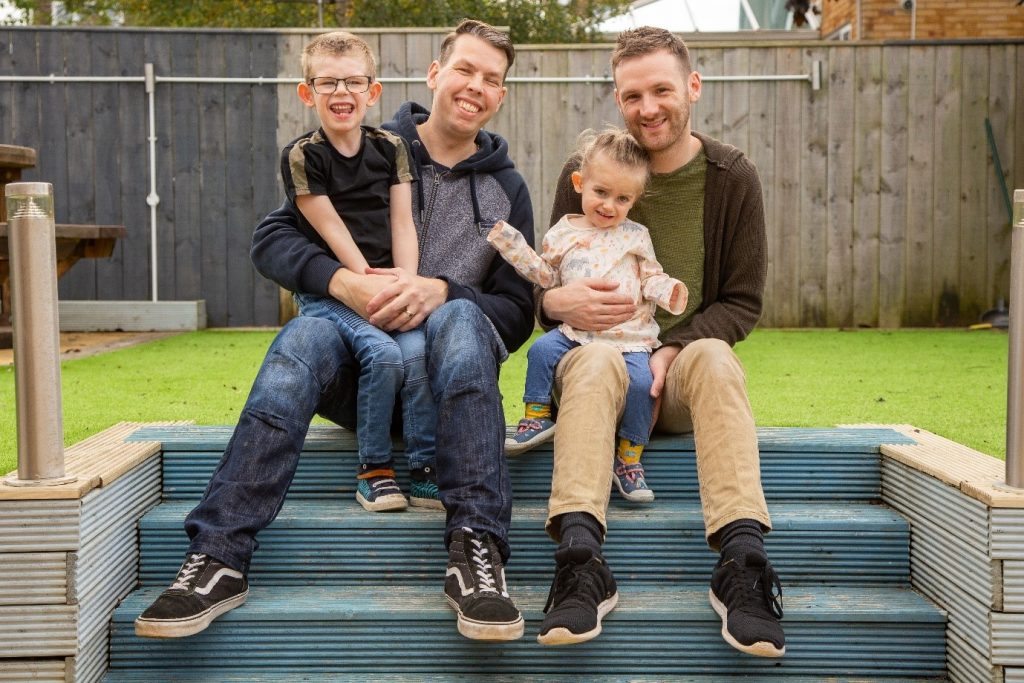Adopting through early permanence is where a child is placed with adopters who are also approved as foster carers. That may mean a child is placed straight from hospital and in the early days, the adopters act as foster carers unless and until a plan for permanence is approved by the court.
The outcome for this type of placement is uncertain, until all of the assessments of birth family have been completed. It is then for the court to decide whether a plan of permanence is the only option for the child.
This article is written by Adoption Tees Valley, sharing what the process was like for two of their adopters.

Chris and Pete adopted siblings Matthew and Amber through Adoption Tees Valley, a regional adoption agency who cover the North East of England. Amber, their youngest child and Matthew’s biological brother, came to Pete and Chris under an early permanence placement.
Early permanence
Early permanence placements are where children, often young babies, are placed in foster care, with carers who are approved as both foster carers and adopters. The carers are able to work with uncertainty around the child’s future plan, while assessments are being undertaken. Early permanence carers will foster the child initially, but will go on to adopt them later if the courts decide they cannot be cared for permanently by their birth family.
The benefit of early permanence placements is that they minimise disruption to children’s lives and give them a chance to bond earlier with people who may go on to adopt them.
Pete talks about their experience
When our adoptive son was five, we received a phone call – he had a biological sister on the way. We were asked if we would consider caring for her on a ‘fostering for adoption’ basis. We didn’t have to think twice about our response. The opportunity to keep brother and sister together – even if just in those formative first stages – with the potential for early permanence, was a no-brainer for us.
We did, of course, have to be realistic and continually bear in mind the different potential outcomes. There was no guarantee this would be any more than a foster placement, and the little girl could be returned to her birth family if that was judged to be in her best interests. But even so, giving her that best possible start to life and allowing brother and sister the chance to get to know each other, was something we were resolute to provide.
During this time, it was amazing to watch their relationship flourish. The love and care they had for each other was clear for all to see. And it provided us with so much more opportunity to talk to our son about his identity, giving the photos and information in his life story book further and more tangible meaning.
Getting to know birth parents
It also allowed us a much greater insight into the children’s identity as parents/carers ourselves. We worked incredibly closely with birth parents. We met them through family time (contact) three times a week, attending medical appointments together and attending official meetings alongside the wide range of professionals there to support everyone. This gave us the invaluable opportunity to get to know birth parents as people – beyond the photos and pen portraits.
This was challenging at times, but all in the best interests of the little girl at the heart of the process – and we wouldn’t have had it any other way.
And now, three years on and an adoption order later, we have those memories and that learning as a family. We can talk to our son and daughter with genuine sincerity that we met their birth parents, that we knew them, and that we saw first hand how much they loved them and wanted the very best for them. That they had had to make some very difficult decisions; that they trusted us. And that ability to provide such an in depth and honest view of their history and identity undoubtedly makes us an even stronger family unit.
If you’re interested in early permanence and would like to find out more, contact Adoption Tees Valley on 01642 526 400, via email or have a look at their website.

To read more early permanence experiences, click here.



